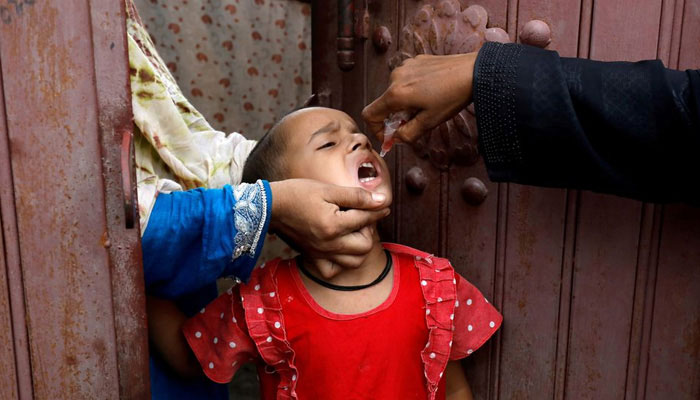
New detection takes total number of positive environmental (sewage) samples in Pakistan in 2023 to 112

- Samples collected from 7 cities across Pakistan.
- New detections take tally of positive samples to 112.
- Samples were of Type-1 Wild Poliovirus (WPV1).
ISLAMABAD: About 14 environmental (sewage) samples of Type-1 Wild Poliovirus (WPV1) collected from seven cities including Karachi in October, have tested positive for the disease, confirmed the National Institute of Health Islamabad on Monday.
According to The News, three samples were collected from Peshawar, two each from Hyderabad and Karachi’s District East, and one each from Karachi’s Keamari, Karachi Central, Karachi West, Sukkur, Kohat, Quetta, and Islamabad.
Giving details, officials said in Peshawar, the environmental sample was collected on December 6, 2023, from the Hayatabad 1 and 2 Tributary environmental sample collection site, which is the 27th positive sample from district Peshawar this year.
The previous 26 positive samples were collected on April 10, May 9, May 16, June 5, July 4, July 17, August 1, August 17, August 22, September 5, September 12, September 20, October 4, October 5, October 23, November 6, November 7, November 20, and December 4, 2023. The isolated virus is classified as YB3A cluster and 98.78% genetically linked to the virus detected in a polio case in Nangarhar (Afghanistan) on May 8, 2023.
Poliovirus was also found in on December 6 from the Yousafabad and Tajabad Tributary environmental sample collection site and Gulababad and Chungee Tributary environmental sample collection site. The isolated virus is classified as YB3A cluster and 98.67% genetically linked to the virus detected in a polio case in Nangarhar (Afghanistan) on May 8, 2023.
In Kohat, environmental sample was collected on December 13 from the Faqirabad environmental sample collection site, which is the third positive sample from district Kohat this year. The previous two positive samples were collected on October 20 and November 14, 2023. The isolated virus is classified as YB3A cluster and 99.89% genetically linked to the virus detected in an environmental sample in Karachi East Gadap on November 13.
In Karachi East, the environmental sample was collected on December 11 from the Machar Colony environmental sample collection site, which is the 12th positive sample from District East this year. The previous 11 positive samples were collected on May 15, September 12, September 26, October 10, and October 12, November 13, and November 15, 2023. The isolated virus is classified as YB3A cluster and 99.4% genetically linked to the virus detected in an environmental sample in Karachi East Gadap on November 15, 2023.
Poliovirus was also found from the Rashid Minhas environmental sample collection site in District East, which is the 13th positive sample from District East this year. The isolated virus is classified as YB3A cluster and 99.6% genetically linked to the virus detected in an environmental sample in Karachi Central (Liaquatabad) on September 7.
Poliovirus was also found in Karachi Keamari’s Muhammad Khan Colony, Haji Mureed Goth environmental sample collection site in District Central Karachi, Khamiso Goth ES site in District West of Karachi.
In Hyderabad, poliovirus was found from the Jacob Pump Station environmental sample collection site and Latifabad-9 Pumping Station ES site while in poliovirus was found from Maka Pumping Station site.
In Quetta, poliovirus was found from Railway Pul site while in Islamabad, poliovirus was found from Jhangi Syedan environmental site. This is the first positive sample from District Islamabad this year.
The isolated virus is classified as YB3A cluster and 99.6% genetically linked to the virus detected in an environmental sample in Peshawar on November 7, 2023.
These new detections took the total number of positive environmental (sewage) samples in Pakistan in 2023 to 112. Moreover, the number of human polio cases in Pakistan in 2023 remained six.